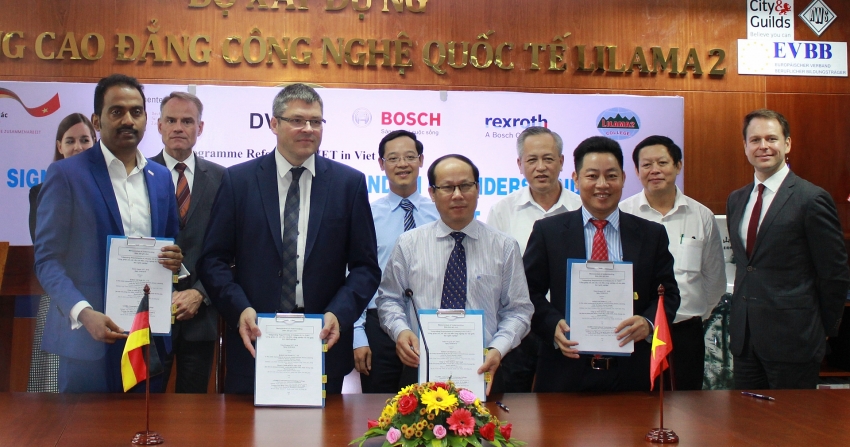Bosch supports training of highly skilled workforce towards Industry 4.0
 |
| Bosch signed a public-private partnership to enable highly skilled workforce towards the 4th Industrial Revolution |
On August 22, Bosch with the Directorate of Vocational Education and Training (DVET), Deutsche Gesellschaft für Internationale Zusammenarbeit (GIZ), and LILAMA 2 International Technology College (LILAMA 2) signed a memorandum of understaning (MOU) for the public-private partnership.
The partnership’s objective is to create a cooperation with the business sector and stakeholders in the technical and vocational education and training (TVET) sector to jointly work on integrating the requirements of the growing technological changes resulting from Industry 4.0 and digitalisation into the human resources development in Vietnam.
This is the next movement of the cooperation partners in contributing the technical vocational education and training in Vietnam, following the goal of making Vietnam an industrialised country by 2020.
The joint project is one of the bilateral activities of the Vietnamese-German development cooperation in the vocational education and training sector. Over €400,000 ($464,640) will be invested into the project for three years. In which, Bosch’s contribution to the joint project will be over €200,000 ($232,320) by establishing a demonstration room with equipment following Industry 4.0 requirements at LILAMA 2, taking part in conducting a demand analysis on skills relevant for Industry 4.0 and supporting LILAMA 2 in adapting its training programmes accordingly.
GIZ’s contribution to the joint project will amount to up to €200,000 by supporting the partners in coordinating the activities, organizing professional workshops, providing further training for teachers, evaluating results of the project, etc. The project is implemented at LILAMA 2. Afterwards it is going to be expanded to other vocational training institutions under the support of the DVET.
“The demand for highly skilled workforce in Vietnam continues to increase and thus this strategic partnership is a critical step to upskill/reskill labor force in order to stay competitive," said Guru Mallikarjuna, managing director of Bosch Vietnam.
Also in the MOU signing ceremony, Dr. Jürgen Hartwig, programme director of Reform of TVET in Vietnam said: “In this cooperation, GIZ supports the partners in adjusting vocational training offers according to the requirements of Industry 4.0. Bosch, as a leading Internet of Things company, is an ideal partner to help develop modern, up-to-date training programs which reflect the demands of the business sector and enhance the competitive ability of Vietnam in a globalised economy.”
The partners cooperate on key fields related to the education and training sector, including awareness raising through the high-raking conference about consequences of Industry 4.0 for vocational education and training; demand analysis, which is collection of best practice examples of Industry 4.0 related training programmes, analysis of demands and preparing of the adjustment of training programmes at LILAMA 2 International Technology College.
Additionally, Industry 4.0 modules/elements will be developed and piloted including further training of teachers and in-company trainers (multipliers), and the results, which are summary of evaluation results of the pilot project, integration of adapted modules/elements in training programmes of other vocational training institutes, transfer of resulting recommendations to the DVET will be disseminated.
“The trainees who take part in the modernised training programmes at LILAMA 2 will obtain the theoretical knowledge and practical skills reflecting the latest technological developments and thus improve their employability. These skills are required not only by foreign-invested enterprises but also by Vietnamese companies which are adapting their processes and services to the changing environment resulting from the 4th industrial revolution,” said Nguyen Khanh Cuong, rector of LILAMA 2 College.
Truong Anh Dung, deputy director general of the DVET added: “This pilot project is very important for us, since the adapted modules can be implemented in vocational training institutes throughout the entire country. Also, we can use resulting recommendations for the integration of topics related to Industry 4.0 into the regulatory framework on the system level.”
What the stars mean:
★ Poor ★ ★ Promising ★★★ Good ★★★★ Very good ★★★★★ Exceptional
 Tag:
Tag:
Related Contents
Latest News
More News
- A golden time to shine within ASEAN (February 19, 2026 | 20:22)
- Vietnam’s pivotal year for advancing sustainability (February 19, 2026 | 08:44)
- Strengthening the core role of industry and trade (February 19, 2026 | 08:35)
- Future orientations for healthcare improvements (February 19, 2026 | 08:29)
- Infrastructure orientations suitable for a new chapter (February 19, 2026 | 08:15)
- Innovation breakthroughs that can elevate the nation (February 19, 2026 | 08:08)
- ABB Robotics hosts SOMA Value Provider Conference in Vietnam (February 19, 2026 | 08:00)
- Entire financial sector steps firmly into a new spring (February 17, 2026 | 13:40)
- Digital security fundamental for better and faster decision-making (February 13, 2026 | 10:50)
- Aircraft makers urge out-the-box thinking (February 13, 2026 | 10:39)

























 Mobile Version
Mobile Version